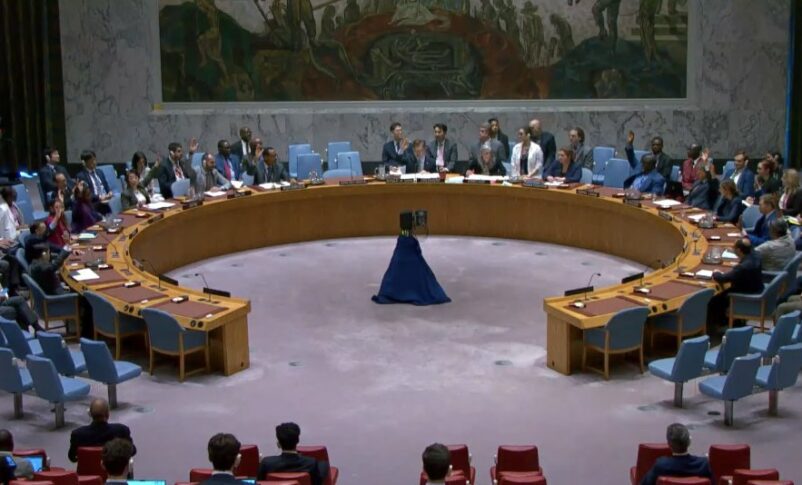UN Security Council approves resolution for localized ceasefire in El Fasher, North Darfur
June 13, 2024 (NEW YORK) – The United Nations Security Council adopted a resolution on June 13, 2024, calling for a localized ceasefire in El Fasher, the capital of North Darfur, Sudan. The resolution aims to ensure unhindered humanitarian access to the city and enable civilians to safely relocate.
With 14 votes in favour and Russia abstaining, Resolution 2736 (2024) demands that the Rapid Support Forces (RSF) end their siege of El Fasher and calls for an immediate halt to fighting in and around the city. The resolution also demands the withdrawal of all fighters threatening civilian safety and security, with the support of local mediation efforts where possible.
The resolution emphasizes the protection of civilians under international law, allowing them to move freely within and out of El Fasher to safer areas. It further requests that the Secretary-General, in consultation with Sudanese authorities and regional stakeholders, provide recommendations for civilian protection in Sudan.
The Security Council called on all parties to the conflict to ensure the rapid, safe, and sustained delivery of humanitarian aid to civilians in need, urging the removal of bureaucratic and other obstacles.
Additionally, the Council encourages the coordinated efforts of the UN Secretary-General’s Personal Envoy on Sudan, Ramtane Lamamra, with the African Union, the League of Arab States, and other regional actors to promote peace in Sudan. Lamamra is currently meeting with Arab League diplomats in Cairo to discuss coordinating efforts with the African Union and IGAD to support the Jeddah process for a ceasefire and an inclusive political process to end the conflict.
The United Kingdom, which drafted the resolution, warned that an attack on El Fasher would be catastrophic for the 1.5 million people seeking refuge there. The British diplomat underscored that the resolution aims to secure “a localized ceasefire” around El Fasher to create conditions for de-escalation across the country, emphasizing the urgent need for civilians to leave the city and for aid to reach those in need.
U.S. Ambassador to the UN, Linda Thomas-Greenfield, stressed that the resolution’s adoption “could not come at a more precarious moment,” adding that the people of El Fasher are trapped and surrounded by heavily armed Rapid Support Forces, with dwindling food, water, medicine, and other essentials.
While acknowledging that the Council is beginning to fulfil its responsibility to stand with the Sudanese people, she emphasized that “this is not a moment for self-congratulation, as the impact of today’s vote will be measured by the results on the ground.”
Speaking on behalf of the “A3 plus one” (Algeria, Guyana, Mozambique, and Sierra Leone), the representative of Sierra Leone clarified that the term “Sudanese authorities” in the text refers “only and solely” to the Sudanese government. He strongly reiterated the resolution’s call on Member States to refrain from external interference and reminded those who facilitated arms transfers to Darfur of their clear obligations.
The Swiss representative emphasized that the resolution sends a strong message to the Rapid Support Forces to lift the siege of El Fasher and to the warring parties to cease hostilities immediately and respect international humanitarian law.
Similarly, Malta’s delegate expressed support for the resolution’s robust message on the illicit transfer of arms to Darfur, reminding all parties of their obligation to comply with the arms embargo. He also expressed dismay over reports of the massacre in Wad Al-Noura in Gezira State.
The Slovenian ambassador echoed the condemnation of the attack in Wad Al-Noura, highlighting the Council’s duty to express concern over the dire conditions throughout Sudan.
Meanwhile, the delegate for the Russian Federation, who abstained from the vote, expressed concerns that the resolution’s text “does not align with the reality on the ground” and disregards fundamental concerns raised by the Sudanese people. The delegate further argued that the resolution includes provisions that are questionable from the perspective of Sudan’s sovereignty and unity.
She asserted, “We cannot agree with the proposed call on all Sudanese parties to ensure free humanitarian access,” highlighting that the matter of national border control and the movement of goods across borders is “a sovereign affair of the authorities in charge.”
The Russian diplomat emphasized that any attempt to bypass this fundamental principle—and even delegate authority to a non-state actor—constitutes a blatant violation of Sudan’s sovereignty and territorial integrity. She suggested that instead of “artificially exploiting the issue of famine,” certain states should prioritize cooperation with Sudanese authorities to address food shortages and support agriculture.
The representative of China, whose delegation voted in favour of the resolution, acknowledged the “recent escalation of the situation in El Fasher and other locations,” which has resulted in “hundreds of thousands of civilians being caught in the crossfire.” He cautioned that allowing the fighting to continue would only worsen the humanitarian crisis and destabilize the entire region, citing a lack of funding as the primary challenge.
(ST)

